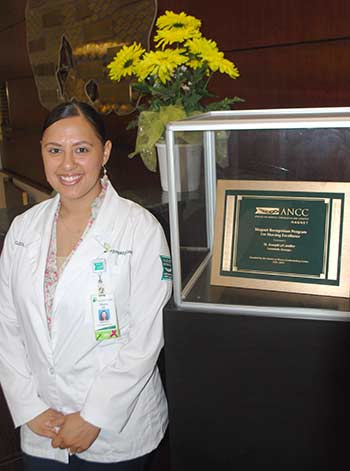Spotlight on St. Joseph's/Candler critical care float nurse Marta Cuevas
Marta Cuevas BSN, RN

Critical Care Float Nurse, St. Joseph’s/Candler
Education: Bachelor of Science in Nursing from Armstrong State University
SJ/C: Why did you become a nurse?
Marta: I’ve always wanted to work in a field where I was able to help people. At the same time, nursing is a field where I will always have a job, and there are so many opportunities in nursing. It’s more than just bedside care.
SJ/C: Why did you choose to practice nursing at St. Joseph’s/Candler?
Marta: Honestly, because it’s a faith-based health system. Also, I remember in nursing school the instructors emphasizing working at a Magnet facility, and because St. Joseph’s/Candler is Magnet Recognized, I knew it was important and that nurses would be a big part of the hospital.
SJ/C: What do you love about being a nurse at St. Joseph’s/Candler?
Marta: I love the ability to switch specialties within the system and the support that they give me being in the military (Navy Reserves), as well as all the shared governance and the opportunities to be a part of all the committees.
SJ/C: What are the functions of your job as a critical care float nurse?
Marta: As a critical care float nurse, I help staff intensive care units, but I can float to any unit including med-surg and the ED, if needed. Some float nurses work in specialty units with training. I work a 96-hour float, meaning I am committed to working 96 hours every six weeks. I put my schedule in on the days I am available to work and I will get a text or phone call to come to Candler and work critical care, for example.
SJ/C: Why did you decide to use your nursing skills as a float nurse?
Marta: Honestly, when I joined the Navy, I wanted the flexibility, and I wanted to stay within the St. Joseph’s/Candler Health System and be a part of shared governance committees. Leadership has been 100 percent supportive.
SJ/C: Do you have a story where you thought, ‘This is why I became a nurse?’
Marta: Yes, and this one happened about six months ago. The census was low in the intensive care unit, so I floated to 6North, which is med-surg. I had six patients, so it was a crazy-busy day. I had one patient who kept asking me if he could take a shower. Because of my critical care background, I didn’t feel safe allowing that, so I kept putting it off and told him I really wanted to ask the doctor first. Finally, I told him we’d have to walk the hallways a couple of times before he could shower, but instead he convinced me to dance with him. So I spent the next 15 minutes dancing with him. Despite all the things I had to do, I danced with him. I think it made his day. I couldn’t believe I was dancing with him. It made me happy, though.
SJ/C: So was he able to get his shower?
Marta: Yes, he got to take a shower.
SJ/C: What does it mean to be a Magnet nurse?
Marta: Being a Magnet nurse means we work in a facility where we give excellent nursing care. Nurses are able to participate in every aspect of the hospital. There’s a nurse on every committee, and nursing and leadership work side-by-side. We definitely have a voice here.
SJ/C: What advice would you offer to new nurses or those considering a career in nursing?
Marta: I would definitely tell the person to make sure they have a passion for nursing. You need to be compassionate. This is not something you just come in and do. I’d also say to always treat your patients like you’d want someone to treat your family member.
Achievements: Chair of the Professional Nursing Council; member of Nursing Research and Evidence Based Practice Council, Nursing Quality Practice Council and Event Related Nursing Peer Review Council
Family: Her husband and two dogs
Hobbies/Interests: Stress relievers like working out, going to the beach and hanging out with family